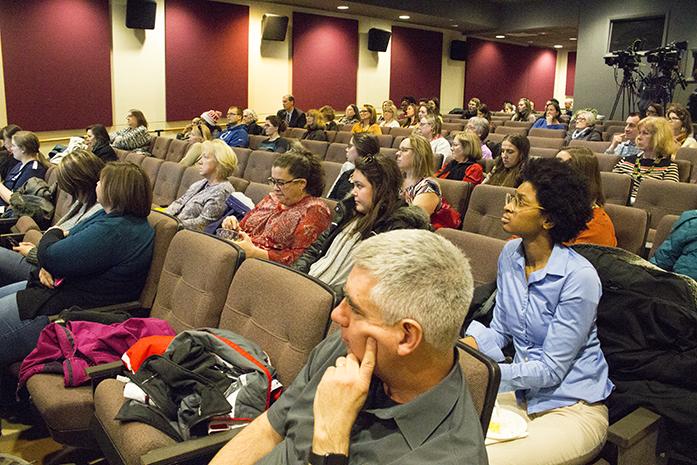By Sarah Stortz
In the IMU on Thursday, engineer Associate Dean Tonya Peeples stood in front of a crowd of prosperous young girls, sharing her experience as a female engineer while leading a panel on how she would encourage more women to partake in STEM fields.
A study from the National Girls Collaborative Project reported that only 19.2 percent of engineering degrees have been awarded to women.
The lack of women in engineering remains prevalent in the University of Iowa, with only 26 percent total of female undergraduate students in the College of Engineering.
To shed light on the subject, Peeples, a professor of chemical and biochemical engineering, hosted a Lunch & Learn for Women in Technology. She was invited by the UI Provost’s Office Outreach and Engagement to talk about inclusion and how it fits in with this semester’s theme of Our Lives Online.
“This is an area where there is a lot of opportunity for career development, and the number of women pursuing these careers is actually declining,” she said. “I want to get the community thinking about what the major issues are.”
Peeples said she believes the reason so many women feel averse to engage with technology may stem from childhood.
“In earlier ages, many girls get engaged with math, but then something happens. When girls are younger, doing math is something that’s not seen as attractive or feminine,” Peeples said. “It also has to do a lot with the environment that pushes women out. Women are not as supported to advance as their male counterpart; you especially see that in a lot of technology companies.”
Aside from this panel, Peeples has served on the Gender Equity Board of the UI Office of the Executive Vice President & Provost and has looked into female faculty in engineering, but this was her first time reaching out to prospective students.
UI senior Sydney Knox studies computer engineering.
“There are maybe a couple other women in engineering in my classes. I’m usually one of five maximum,” Knox said. “It’s an everyday thing, so I’m pretty used to it, though there are moments where you scope around the class, and it kind of hits you.”
Although Knox said she’s never faced any discrimination at school, she feels she has additional pressure compared to her male colleagues. “You have lesser representation, so you have a bigger pressure to do well,” she said. “If we failed a class, it would reflect all women, but that’s absent for all men.”
However, outside of the classroom, Knox has reported on instances during her internship where she was accused of getting the job solely based on her gender.
Knox said she also believes young girls are continually told to stay away from engineering.
“I think that from my perspective, people still view engineering as a very manly field,” she said. “It’s a subconscious pressure that girls shouldn’t be interested in it.”
UI senior Yashila Permeswaran, who studies computer engineering, thinks girls are afraid to step across boundaries.
“There’s a misconception that if you go into engineering, then you’re cold and you don’t care for people,” she said. “A lot of women were taught early on that you need to care about people, but I still think we can be caring as engineers. You can still make a difference and still help people. I don’t think that’s well communicated enough.”
Permeswaran sees events like Lunch & Learn as highly beneficial for girls who are considering engineering.
“I think exposing girls to technology can give them the idea that this is a real possibility for them,” she said.







